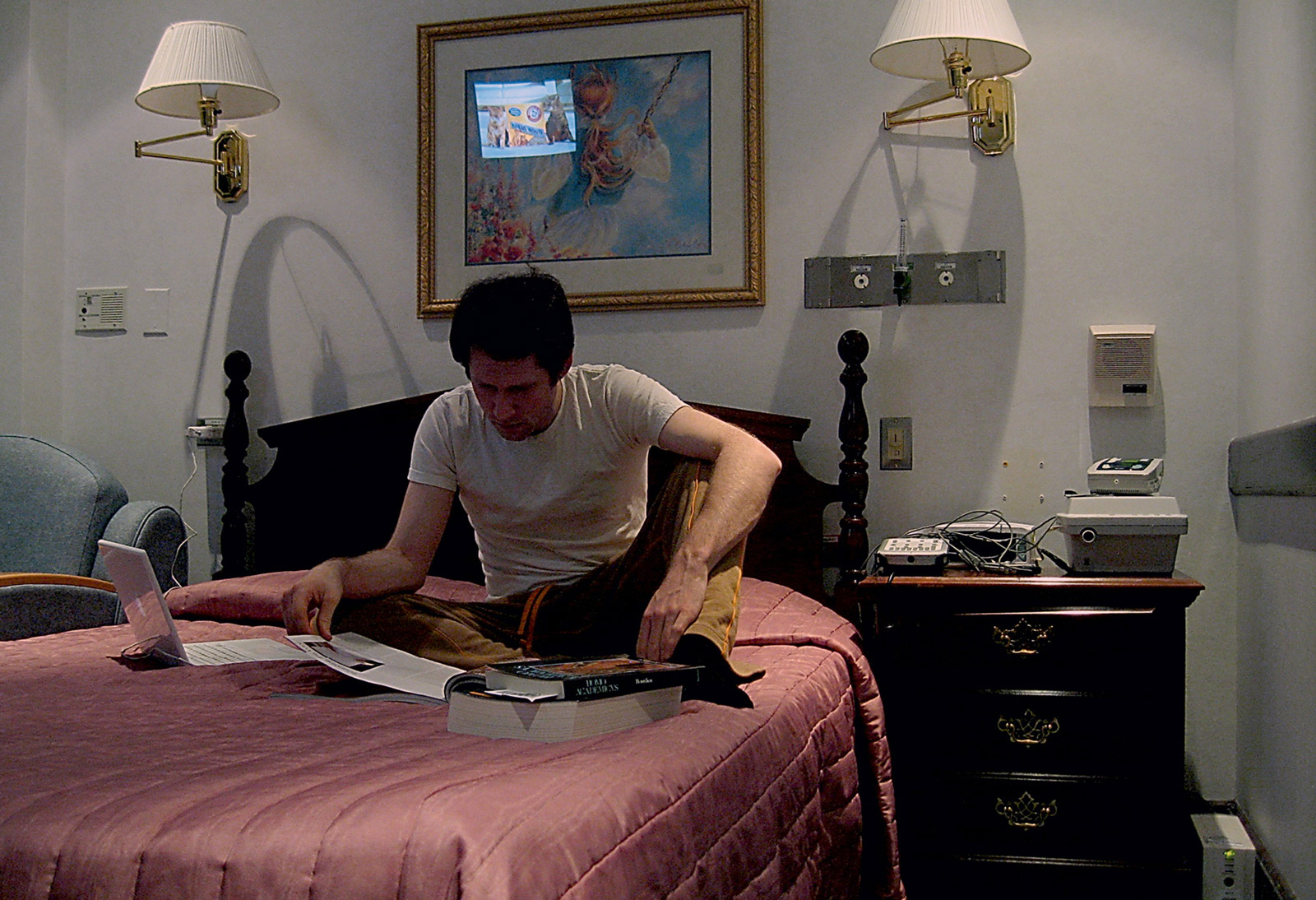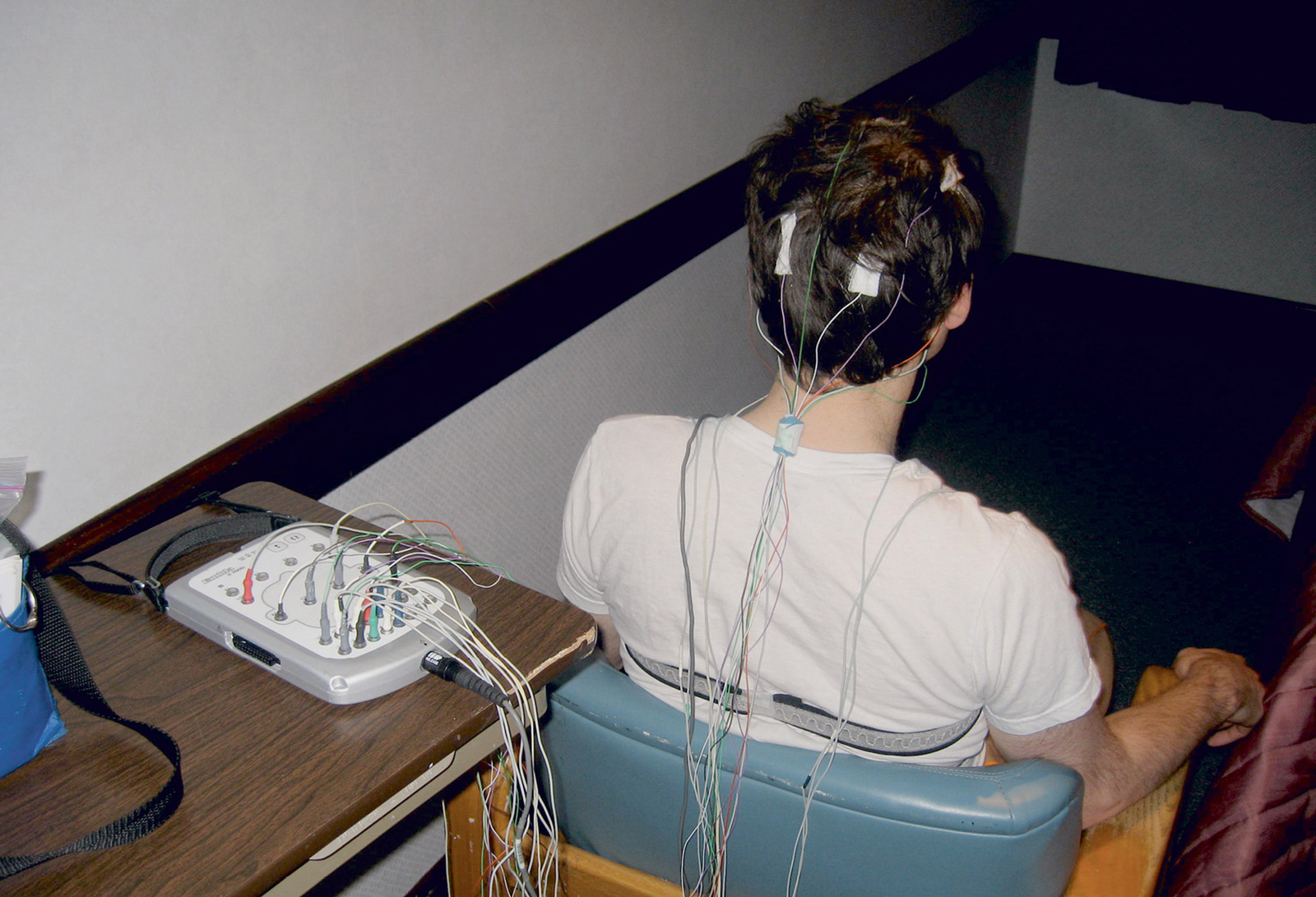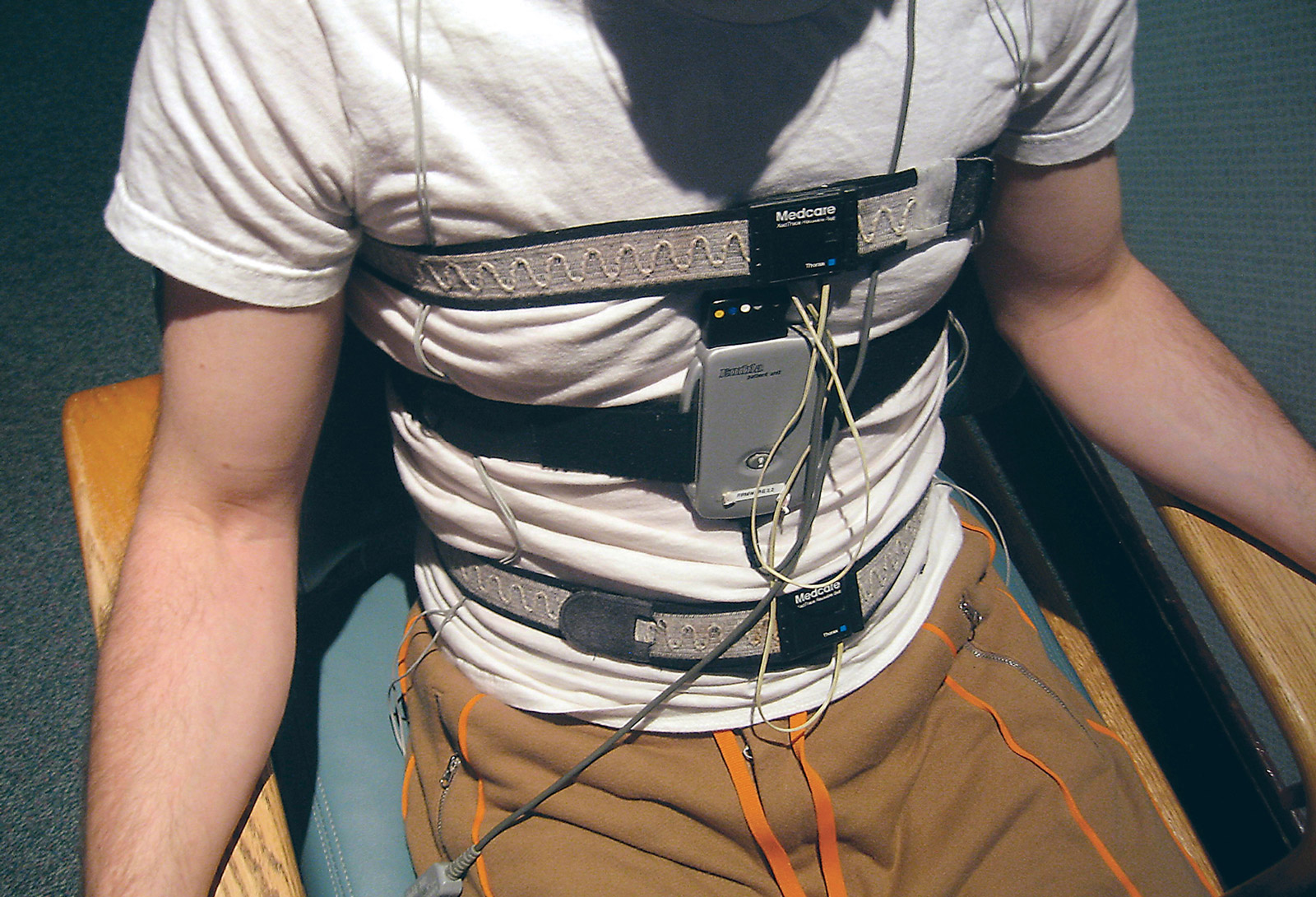Sleep Like Napoleon: An Interview with David Dinges
Your brain in bed
Aaron Levy and David Dinges
“It is a matter of common sense that a human has to recover,” a 1918 United States congressional statute reads, attesting to the societal importance of limiting the hours one can work each week and insuring proper time for leisure and recovery. Since 1918, however, the United States worker has seen the workday continually expand and leisure time consistently erode. We live today in a twenty-four hour, seven-days-a-week global economy that has pilots, NASA scientists, truckers, and editors all falling asleep at the wheel.
How does sleep today compare to ten years ago or a thousand years ago? In January 2008, Aaron Levy sat down with David Dinges, Chief of the Division of Sleep and Chronobiology at the University of Pennsylvania School of Medicine, hoping to explore this question and to learn how to sleep less and work more. Instead, he learned about the importance of being asleep at nine o’clock and about the physiological and cognitive changes that result from sleep deprivation.
Aaron Levy: Is there a way to quantify the benefits of sleep? “Sleeping in” has such negative connotations, as if it were embarrassing. How did sleep get such a bad reputation?
David Dinges: There’s been six or seven million years of evolution, but it’s only in the last 150,000–250,000 years that homo sapiens appears, distinguished primarily by a bigger prefrontal cortex. Those areas of the brain are particularly good at multitasking, and at imagining or anticipating time and space. It’s at that point in hominid evolution when you suddenly see developments such as shift work, missions to the moon, artificial lighting, and fraternities—all the things that make up our modern and bizarrely artificial human existence. This endless assault on time and space comes from the frontal lobe. All the activities that don’t involve heavy use of the pre-frontal cortex, including sleep, are de-valued. Things that are seen as merely behavioral requirements in humans—physiologic requirements—are denigrated as lower-grade activities, and many people talk about them in a pejorative way.
Sleeping signifies laziness.
It certainly equates to that. Even my hero, Ben Franklin, has plenty of sayings about it. People who tend to wake up earlier in the morning—the natural larks, as it were—historically feel righteous, and they’re the ones typically admonishing others that they should not stay in bed. They don’t feel any guilt about being in bed asleep at nine o’clock in the evening, however, when the owls are up.
What is the physiological impact of living a sleep-deprived life?If you don’t get adequate sleep time, the ability to use your prefrontal cortex can be eroded. And it can lead to serious errors and mistakes, and potentially exacerbate stress reactions and poor emotional states. We know that attention, memory, speed of cognition, creativity, and judgment are all impaired by sleep deprivation. The problem is accelerating in the sense that we have more people awake more of the time. But culture can also simultaneously take corrective action so that people oversleep on the weekend, or they take caffeine. Of concern to me and other sleep researchers is that you see an erosion today of oversleeping on the weekend as well as of the recovery periods. In my discussions with federal agencies and industries—whether it’s airlines, railroads, highway trucking, power plants, or any twenty-four-hour industry—I’ve come to realize that economic factors are the driving force.

So what goes on inside your sleep laboratory?
Most recently, we have set up a series of experiments where 260 people will be studied for 4,000 days in the laboratory. Each individual sleeps for four hours a night for five nights in a row to build up sleep pressure. About 85% build up pretty high impairment, and then we give them varying amounts of “recovery” sleep for two nights to determine how quickly and thoroughly we can bring back their performance to baseline levels. This gives us information on what factors influence the rate of recovery from sleep debt.
But there’s a more fundamental question, and that’s the recycle question. For NASA, we’re looking at the recycle question because they, like in many other areas of society, cannot afford two days off, for instance if you’re in space flight. So the question became: if you go five nights at four hours, and then I give you one night of a varying amount of sleep for recovery, what happens if I then send you back into five more nights of four hours? Is your rate of deterioration the same as it was initially, worse, or in fact better? And how much does the dose of recovery sleep influence it? That is biologically and theoretically important in the sleep field, because if we find that it’s worse the next go-round, then that suggests there are cumulative effects of sleep debt that go across weeks or months.
The real controversy in my mind, however, is this: are we working during sleep? This goes to the question of what sleep is for. Some of the current neurobiological theories suggest that it is for metabolic and synaptic downscaling, locking in memories of your experiences of the day, and cleaning out all the other stuff. By reducing the metabolic demand on the brain, you are both consolidating what was learned that day and preparing the brain to learn anew the next day. I find these theories very attractive because they fit with the paradigm that sleep is for making sure that the brain is maximally efficient so that behavior becomes maximally efficient.
To what extent can we control how we sleep?
The frontal lobe and other areas of our cerebrum can be thought of as attribution tissue; meaning these brain areas are continually making causal inferences about what we experience. This gives us the sense that we are willfully in charge of our lives, even though I would argue that biology doesn’t wait for either our consciousness or our attributions. For example, we think our behavior before going to sleep is consciously controlled, but it may be more biologically programmed than we realize to ensure we can get to sleep quickly and stay asleep, without having to think about what must be done. We will all go home tonight and we will remove our clothing and we will go into a room that’s kind of strange—its cool, it’s a bathroom—and we will put water in our mouths, and if I ask you what you’re doing, you’ll tell me about oral hygiene and how you take care of your teeth. And then we’ll lie supine in bed with our heads, hands, and maybe a foot out from under the covers. We may then fall asleep thinking about nothing in particular and confident that we elected to do all this willfully. However, these cooling down behaviors are what we must do to ensure we reduce body heat to facilitate sleep onset. A chemical released from our brain’s pineal gland under the control of a biological clock in our hypothalamus further ensures that this genetically programmed behavioral repertoire occurs.
Now, I submit to you, despite all of your attribution arguments, that this is a biological response. You cannot avoid it, and in fact you are no different than a dog circling before it lies down. What the prefrontal cortex does, however, is to make up a story about it, and thinks that it willfully did that, and that’s the illusion of conscious control of such a fundamental behavioral activity for a basic biological need.


That reminds me of Napoleon’s remark that “different subjects and different affairs are arranged in my head as in a cupboard. When I wish to interrupt one train of thought, I shut that drawer and open another. Do I wish to sleep, I simply close all the drawers and then I am—asleep.” It is as if sleep seems entirely volitional for Napoleon, rather than an involuntary biological and physiological need. He also claimed “I have never found the limit of my capacity for work.”
Napoleon always talked about fatigue as the fundamental limitation. If you could keep your troops active for longer periods of time with less sleep, you had a greater tactical advantage, assuming they would remain behaviorally effective. You also just gave a perfect description of the way high-performing people with a great degree of prefrontal cortex control imagine they can extend that to sleep.
What is the prefrontal cortex doing while we sleep?
Neuro-imaging studies of the sleeping brain say that during REM dreaming sleep, with its rich and bizarre visual imagery, the pre-frontal cortex is offline, but not during slow-wave sleep, which is thought to be the synaptic down-regulation stage. There was a very careful study done many years ago, where they woke people from these stages of sleep and asked them about what was going on in their head. Surprisingly, when they woke them from dreaming sleep, with the prefrontal cortex offline, they all said, “I was asleep.” But when they woke them from deep slow-wave sleep, they said, “I was thinking.” This suggests that the brain may be processing information during certain stages of sleep. The neurobiological theories of Giulio Tononi and colleagues suggest it is removing some types of synapses and consolidating others, packing information in some neurobiologically efficient way to make the brain ready for another new day.
Is there an ideal period of time that one should sleep for, or does it in fact vary by individual?
In the large-scale experiments we have undertaken, involving thousands of days in the labs, we give different people eighteen different doses of sleep. Some people got six hours a night; other people got four plus a two-hour nap, five plus a one-hour nap, and so on. The idea was to see if we interrupted the buildup of the homeostatic drive for sleep with a nap, whether those people who received their daily sleep in two doses separated by twelve hours (i.e., a split-sleep schedule) end up functioning better. But the experiment revealed this not to be the case. It turned out that total sleep time per day—regardless of how it was acquired—was the dominant predictor of cognitive performance capability. And yet what everybody wants today is to get down to sleeping for four hours without consequences. Our studies reveal that sustained reductions of daily sleep duration result in reliable cumulative deficits in cognitive performance, especially in attention, cognitive speed, and memory.
I’ve read that people who work night shifts also have increased rates of heart attack. Why would this be?
This is a big scientific mystery. What are the precise effects of sleep displacement and circadian disruption in nightshift work? Why is it that nightshift workers may have higher rates of cancer? Why is sleep deprivation associated with mortality, obesity, diabetes, stroke, and heart attack? These scenarios aren’t causal—we live in an age of epidemiology where we try to give meaning to our lives through correlation and causality. Sometimes we are very right, such as in coming to understand how smoking causes cancer, but sometimes we just don’t know.
Many of the federal agencies that fund my laboratory’s research do so to determine if we can find a way to reduce the need for sleep. Thus far, everything we have tried has had only modest effects. Despite all of our grandeur as a species, sleep is essential and binds us to our biological heritage on Earth.
One final question: what kind of coffee have you been drinking during this interview?
This is the breakfast blend—the biggest dose of caffeine.
David Dinges is chief of the Division of Sleep and Chronobiology, and director of the Unit for Experimental Psychiatry in the Department of Psychiatry at the University of Pennsylvania School of Medicine.
Aaron Levy is executive director and a senior curator at Slought Foundation, and lecturer in English at the University of Pennsylvania. Publications edited include Blood Orgies: Hermann Nitsch in America (2008) and Cities Without Citizens (2004), and a series of DVD publications with Alain Badiou, Dennis Oppenheim, Vito Acconci, and Werner Herzog (all published by Slought Foundation). He is co-curator of “Into the Open: Positioning Practice,” the US representation at La Biennale di Venezia, 11th International Architecture Exhibition.